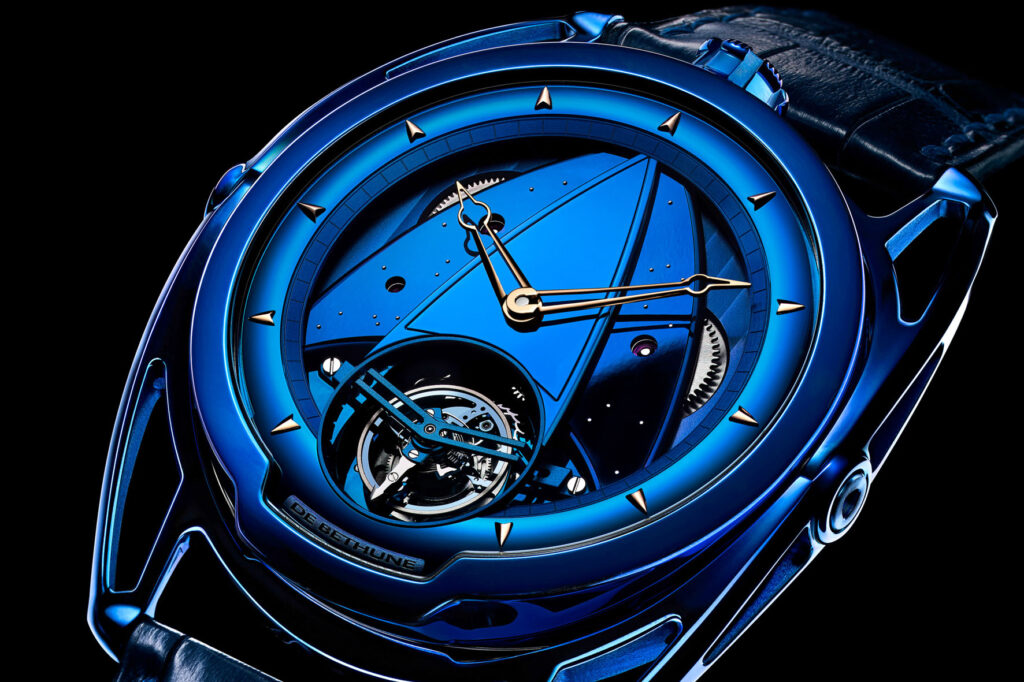Denis Flageollet and the uniqueness of De Bethune
19 December 2023When it comes to predestination in watchmaking, there are few stories as peculiar as that of Denis Flageollet. The co-founder of De Bethune is the son, grandson and great-grandson of watchmakers. The strange thing, however, is that as a child he was not particularly passionate about watchmaking, he was more interested in tools. From an early age he knew how to assemble and disassemble alarm clocks, normal given that he was surrounded by them. But he didn’t want to do the same job as his father.
Luckily for us enthusiasts, at a certain point his educational path took the direction of watchmaking, which led him first to become an antique-clock restorer and then to meet people like Michel Parmigiani, François-Paul Journe, Dominique Mouret, Simon Bull, Vianney Halter, Thomas Baumgartner and to collaborate with them.
In 2002, together with David Zanetta, Denis Flageollet founded De Bethune with the immediate aim of bringing the culture of “Belle Horlogerie” associated with the 18th and 19th centuries to the wrists of clients. The idea was to adapt great classic watchmaking to modern watches. An idea that worked. Denis Flageollet told us this in this exclusive interview.
Where does the name De Bethune come from and how did it come about?
It comes from Maximilien Henri De Bethune (1669-1729). The Chevalier De Bethune, was part of the Order of Malta and inventor of several mechanical processes. He created the famous Chevalier De Bethune escapement used by the greatest watchmakers of the time, including Julien Leroy. It is in this same spirit of technical innovation that De Bethune develops and manufactures its products every day.
Your payoff is “L’art horloger au XXI siecle”. What makes De Bethune different from the watchmakers of the 20th century?
Everything! They promoted industrialization, we promote craftsmanship and manufactured work, they promoted standardization, we promote innovation, they promoted simplification, we promoted excellence and the list goes on and on.
Aesthetics or mechanics: which, of the two, drives you when you conceive a new watch? Or does neither of the two prevail over the other?
Both are equally important: well-functioning mechanics are generally very aesthetically pleasing, and aesthetics in turn engender good functionality.
When I think of De Bethune, the first things that come to mind are: floating lugs, oxidized titanium cases, meteorite dials and starry skies. Watches with an “insane” character like the DB28 Kind of Blue, alternating with more classic models like the DB25 Starry Various. Where does your inspiration come from and what kind of audience do you aim for?
We don’t have a specific targeted audience: we make watches that give us pleasure, watches that we’d like to wear, watches that add a new stone to the edifice of fine watchmaking, watches that pay homage to the great innovators of the Age of Enlightenment. In short, watches with meaning. When passion is there, inspiration becomes natural.

Have you ever thought about an “entry level” watch for a wider audience?
We have the DB27 which represents the entry level price of De Bethune.
WatchBox recently took over the majority holding of De Bethune: what has this meant for the brand and how will it affect the future?
This significantly strengthens the brand’s capabilities, thus increasing its inventiveness tenfold.
In recent years, independent brands are having more and more success: what has changed in the market and in the world of collecting?
Collectors are increasingly well-informed about the reality of the products, and this has helped to highlight the real authenticity of independent’s know how, compared to the big brands which struggle to renew themselves and offer truly innovative expertise.
What are the strengths and weaknesses of being an independent manufacturer?
The independent is reactive, creative and innovative, and if it’s also well organized and takes care of its teams and has reserves to face difficult times, it’s far stronger than any other brand.
By Davide Passoni

